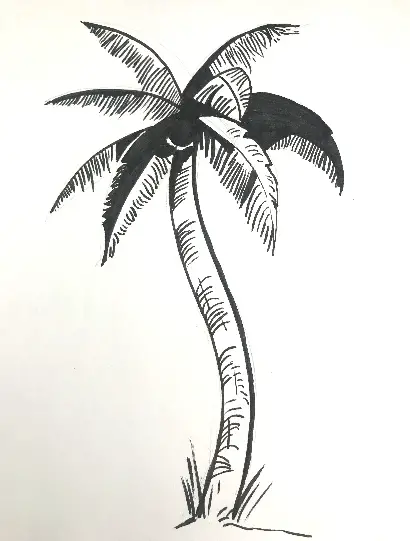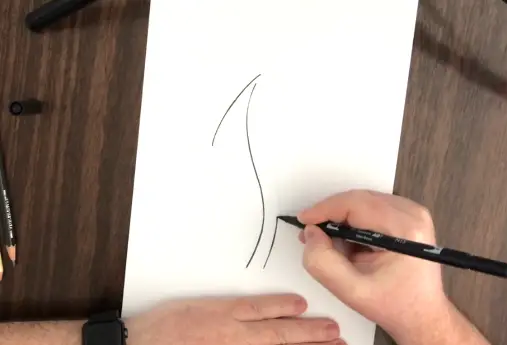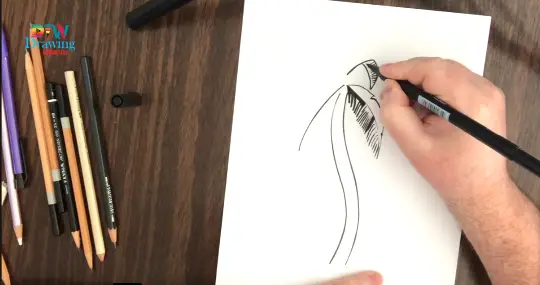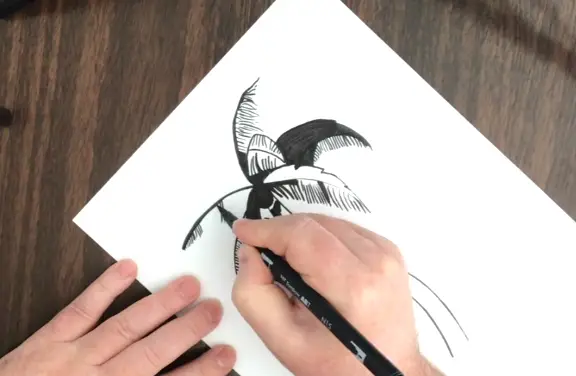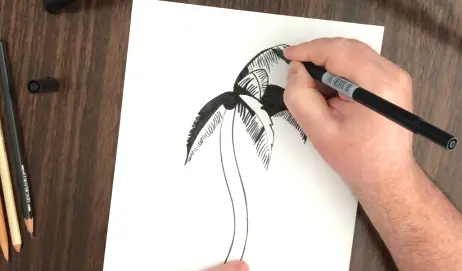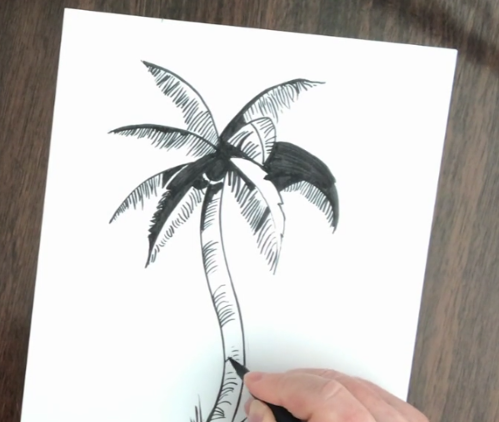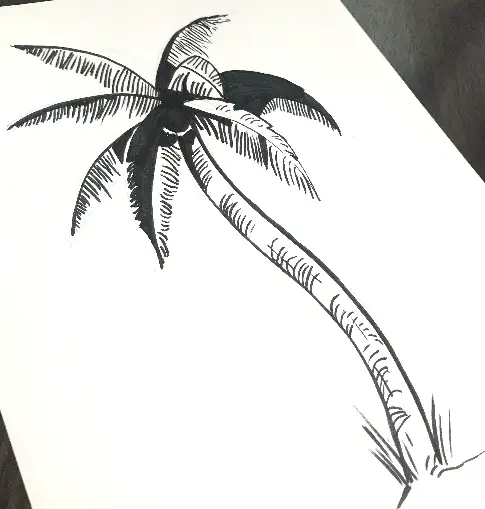Palm Tree Drawing
When your goal is to learn how to draw a palm tree, there is some essential tips that you’ll need to follow in order to get started.
Basic Equipment You Will Need
First, you’ll need to decide what type of medium you will be working with.
You could use graphite, ink, pastel, or anything else that feels like an approach that appeals to you.
Next, choose your surface; again, choose anything that seems like a good option so long as it will work for the medium you will be using.
- Pencils
- Pens
- Paper
- Reference Image or Palm Tree to Draw
You can find essential drawing equipment to complete this task here: Click here to view my basic equipment list.
Draw a Palm Tree Step by Step
Sketch The Tree Tunk Outline
Your starting point should be the same whenever you start any new drawing. It should be a light sketch. This is the foundation that everything else is built on top of.
Much like the foundation of a home, the initial sketch should be solid before you start trying to move on to more advanced parts of the drawing.
To keep in mind, your trunk outline should be done with a light hand. This will enable you to go back and make corrections as you go from a simple sketch to a more advanced drawing.
How to Draw Palm Trees Leaves
Palm tree leaves are unique in the tree world because they are much larger and more prominent than any other type of tree you’ll ever encounter.
They are also structured differently than other trees. Most trees have branches that start from large to small as they spread out from the tree’s trunk. At the ends of the branches are the smallest part of the tree.
It’s here that leaves grow. But, palm tree leaves don’t grow on branches. They grow directly from the tree. They are so large that they are the size of many other types of tree branches! How do you draw them?
They have a roughly triangular shape, so start by sketching the basic shape. Once you have the basic shape, you can then start to refine the sketch by defining the different parts of the leaf.
Draw the Edge of the Tropical Leaves
One of the more exciting features of palm trees is the sharp edges along the ends of each leaf.
Typically you should avoid drawing sharp edges when drawing natural forms, but in the case of palm trees, you should embrace doing this.
The edge of each leaf should be clearly defined. This will help to give structure to your drawing and provide it with a clear definition where there should be a clear definition.
Draw the Shadows
Once the trunk and leaves have been drawn, that covers most of the essential structure of the palm tree. At this point, you should start to add more details, including adding shadows.
Adding shadows and creating a range of values is how we, as artists, can create the illusion of depth when drawing something on a flat surface.
One of the most common mistakes that artists of all experience levels make is not creating shadows with a full range of values. It is acceptable for you to create the darkest values in an image.
It’s a necessity if you want your image to look realistic. Study your subject, then start adding shadows going from light to dark.
You’ll probably be surprised at how quickly this will help to transform your sketch into a finished drawing.
Draw Coconuts
When drawing palm trees, one thing that you can’t forget is to add the coconuts. Without coconuts, a palm tree will be missing one of the essential features that define it as a palm tree. Fortunately, coconuts are simple to draw.
They are spheres with some textures on them. Make sure that you pay attention to how they are arranged on the tree. If you just start putting coconuts everywhere, it will not look right.
Place them correctly and add texture and shadows to them, and they are one of those little details that can go a long way toward making your palm tree look more realistic.
Also, make sure to draw your coconuts the way that they appear when they are still in the husk on the tree. Everyone thinks of coconut and probably pictures around, a brown sphere.
But, in the tree, coconuts are larger and have a green husk still.
Add Detail and Texture to the Tree Trunk
When drawing most subjects, you want to add details and then do your shading on top of the details. If needed, you can go back in and add additional details after you’re done to tighten things up.
But, when drawing a palm tree, you’ll want to add the shading first, then go back and add the texture and details.
This is because the details and texture are relatively simple, and if you shade on top of them, you could quickly lose them beneath the shading.
Draw the Base of the Palm Tree Drawing
One thing that palm trees have in common with other types of trees is that the base will be wider than the rest of the trunk.
Make sure that you give your palm tree a solid base that looks like it would support the rest of the tree. Also, make sure to draw the ground and add some details.
Drawing a few fallen coconuts on the ground can make a huge difference in how realistic your drawing looks.
Add Additional Background
After finishing your palm tree and ground, take some time to add some more background details. If you draw a tree just sitting in an open space, it will not look like a realistic scene.
But, if you draw a palm tree on a beach, surrounded by sand, fallen coconuts, and maybe some seagulls and a crab, you’re getting somewhere!
What about adding some crashing waves in the distance or some clouds? Why not?
You have an artistic license here, so do whatever you think you need to do to complete your drawing.
Additional Questions:
How to Draw Tropical Trees
If you enjoy drawing a palm tree, make sure to take the time to start exploring how to draw other types of tropical trees as well.
Tropical trees all have a similar appearance, with large green leaves, making them an interesting subject to draw.
Another benefit is that tropical trees are very distinctive compared to non-tropical trees, so when someone sees your drawing, they’ll automatically know what kind of tree they are looking at.

